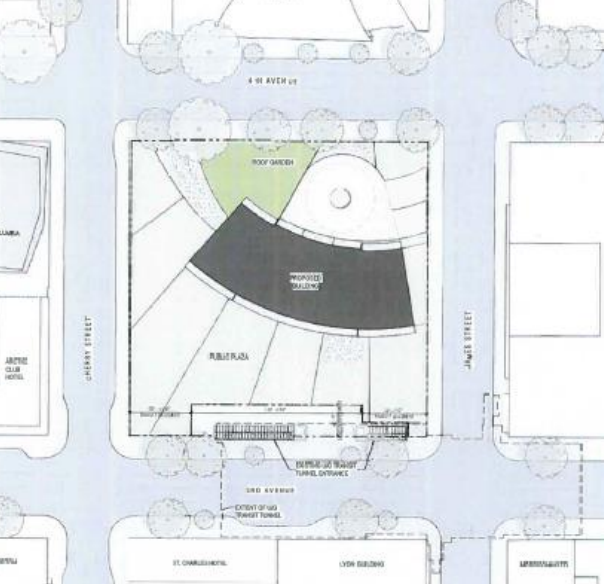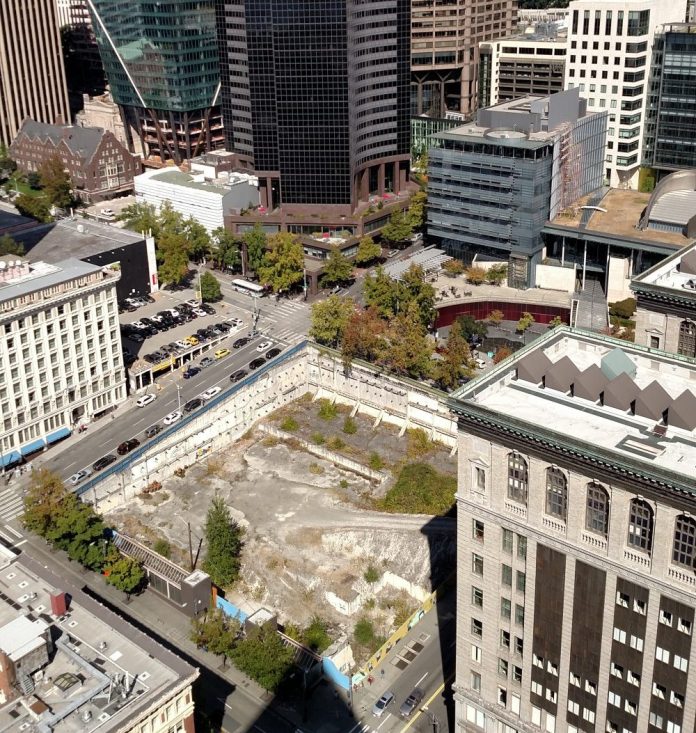A long idle giant pit near Seattle City Hall is poised to get a new owner and perhaps new life. The Civic Square site, as it is known, has a storied history, but on Monday the Seattle City Council turned the page, voting to give their approval to new terms for a purchase and sale agreement.
Bosa Development, a British Columbia-based development firm, will buy the full block site for $16 million and construct a new residential high-rise tower. Bosa is known locally for their twin residential high-rise project, Insignia Towers, in Belltown. Proceeds from the sale of the site will go to the Equitable Development Initiative fund to help provide a variety of local investments.
A Brief History of Civic Square
Civic Square was originally the City’s old public safety building but was torn down in 2005. Shortly thereafter, Mayor Greg Nickels’ administration negotiated a deal to transfer the property to Triad Development, a private development firm, to construct a high-rise tower on the site in exchange for providing a new large public plaza space on the site. Triad struggled to find financing for the project and then the Great Recession hit in 2008 bringing the prospect of redevelopment to a halt and adding it to the rolls of squandered public land in Seattle.

In 2015, Triad become embattled in scandal during the general election after revelations that a senior executive with the company was trying to bribe Jon Grant to gain favor for the Civic Square redevelopment. Grant was a candidate for Seattle City Council that year (he is again this year) and rejected and made public the illicit offer. In response, Mayor Ed Murray sought to end the relationship with Triad over development of Civic Square, but unwinding that relationship hasn’t been easy.
Mayor announced in October they had an MOU and were negotiating a deal with Bosa Development. https://t.co/PK9xA2Ynlu
— The Urbanist (@UrbanistOrg) June 7, 2017
The Bosa Deal

Under the terms of the new agreement, Bosa will also be required to provide a public plaza measuring more than a half acre–at least 25,000 square feet to be exact.The plaza space is expected to be located primarily northern and western portions of the site, which should help better activate the space near the Pioneer Square station entrance on Third Avenue. The project entails construction of ground floor retail space, an underground parking garage, and private amenity space for residents. The agreement stipulates that the residential units will be condominiums and that the building will be at least 572 feet tall, which suggests that it would be similar to the original 43-story building proposed more than a decade ago.
In addition to the $16 million that Bosa will pay to close on purchase of the property, the company will also be subject to other acquisition cost conditions and terms:
- Voluntary affordable housing contribution. Bosa will need to satisfy voluntary affordable housing contribution conditions prior to closing on the property. The terms set a minimum of $5.7 million in voluntary affordable housing contributions to the City, which can be credited for participation in the City’s Mandatory Housing Affordability program and other affordable housing incentive zoning programs. If participation in those programs totals less than the $5.7 million outlined in the agreement, Bosa will need to pay the difference to the City.
- Other project costs. The developer will be on the hook for tens of millions more to pay for recording covenants, releasing liabilities, shoring of walls on the site, potential litigation, and other costs associated with taking ownership of the site.
- Pioneer Square Station operations. The terms of the sale require the developer to ensure that operations at Pioneer Square Station are not affected during construction. This means that buses (if they are still in the tunnel at that time) and light rail should keep operating as normal throughout the life of the project.
- Project labor agreement. The developer and its contractors will be subject a special project labor agreement (PLA) that requires cooperation with unions, avoiding lockouts and strikes, contracting with small and minority-owned construction companies, and hiring locally, for instance. The City describes it as “job-site constitution” between the construction management team and labor unions.
The City sold the land to Bosa who has switched focus from offices to housing and hired James K.M. Cheng Architects. https://t.co/oPl9YvZjIY
— The Urbanist (@UrbanistOrg) August 21, 2017
Sawant’s Criticism
While the new purchase and sale agreement received approval from the City Council, it was not unanimous. Councilmember Kshama Sawant was highly critical, calling the agreement “corporate welfare” and highlighting why it may not be such a good deal for the public. Part of her testimony centered on the fact that there was not a recent private appraisal conducted on the property to determine if it was being sold for the right price. She linked a recent sale of Seattle City Light property in South Lake Union as an example where such an appraisal had been conducted.
Councilmember Sawant also felt that the terms for voluntary affordable housing were largely meaningless since the Mandatory Housing Affordability program would already require the provision of affordable contributions. Instead, she suggested the City might be better served by allowing second high-rise tower on the site to get more value out of the land for affordable housing and forgoing the public plaza. Her reasoning on nixing the public plaza, by the way, was that people often feel uncomfortable when public facilities are put on clearly private property, ultimately resulting in lack of use.
Councilmember Tim Burgess revealed after Sawant’s comments that a preliminary estimate put Civic Square’s value between 45 and 55 million dollars, though apparently the appraisal was never finalized. Burgess argued the value that the City was getting was near $50 million when adding in the liability Bosa is taking on from a likely Triad lawsuit–liability that would otherwise be the City’s.
Before construction can begin on the tower, Bosa will need to obtain new permits for the site. The City estimates that construction could begin in early 2019 and be completed within 48 months.The permitting process will involve design review. The first design review meeting is scheduled for November 7th. Ownership of the property will not transfer to Bosa until the developer has received an approval for the Master Use Permit and terms of the purchase and sale agreement have been satisfied.
Stephen is a professional urban planner in Puget Sound with a passion for sustainable, livable, and diverse cities. He is especially interested in how policies, regulations, and programs can promote positive outcomes for communities. With stints in great cities like Bellingham and Cork, Stephen currently lives in Seattle. He primarily covers land use and transportation issues and has been with The Urbanist since 2014.


